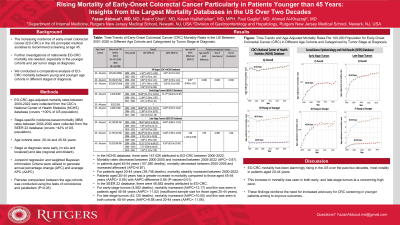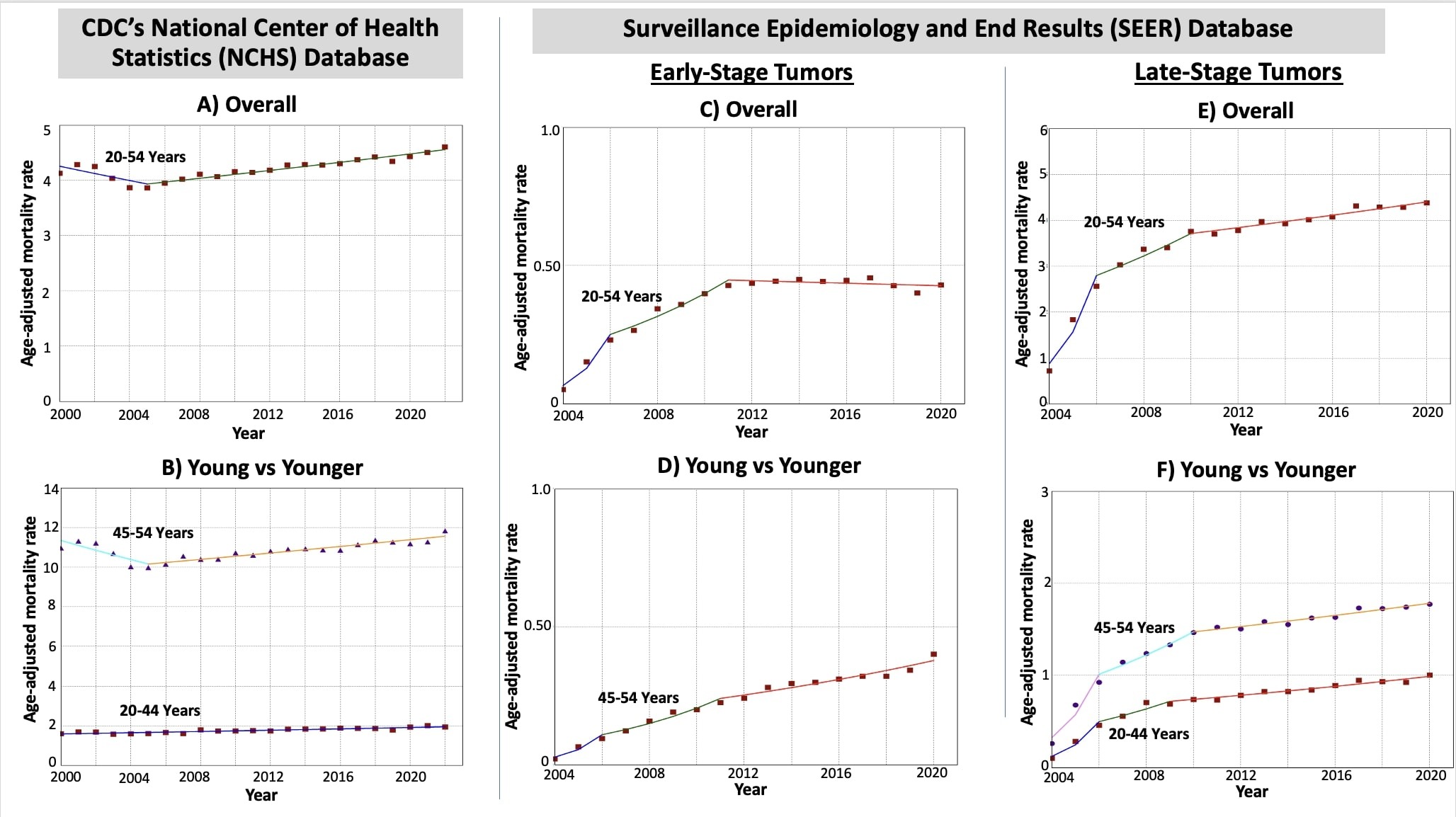Tuesday Poster Session
Category: Colorectal Cancer Prevention
P3865 - Rising Mortality of Early-Onset Colorectal Cancer Particularly in Patients Younger Than 45 Years: Insights From the Largest Mortality Databases in the US Over Two Decades
Tuesday, October 29, 2024
10:30 AM - 4:00 PM ET
Location: Exhibit Hall E

Has Audio
.jpg)
Yazan Abboud, MD
Rutgers New Jersey Medical School
Newark, NJ
Presenting Author(s)
Yazan Abboud, MD1, Anand Shah, MD1, Kaveh Hajifathalian, MD1, Paul Gaglio, MD2, Ahmed Al-Khazraji, MD1
1Rutgers New Jersey Medical School, Newark, NJ; 2Rutgers NJ Medical School, Newark, NJ
Introduction: The increasing incidence of early-onset colorectal cancer (EO-CRC) in the US prompted medical societies to recommend screening at age 45. Further investigations of nationwide EO-CRC mortality are needed, especially in the younger cohorts and per tumor stage at diagnosis. Therefore, we conducted a comparative analysis of EO-CRC mortality between young and younger age cohorts in different stages of diagnosis.
Methods: EO-CRC age-adjusted mortality rates between 2000-2022 were collected from the CDC’s National Center of Health Statistics (NCHS) database (covers ~100% of US population). Stage-specific incidence-based mortality (IBM) rates between 2004-2020 were collected from the SEER 22 database (covers ~42% of US population). Age cohorts were: 20-44 and 45-54 years. Stage at diagnosis were early (in situ and localized) and late (regional and distant). Joinpoint regression and weighted Bayesian Information Criteria were utilized to generate annual percentage change (APC) and average APC (AAPC). Pairwise comparison between the age cohorts was conducted using the tests of coincidence and parallelism (P< 0.05)
Results: In the NCHS database, there were 147,026 attributed to EO-CRC between 2000-2022. Mortality rates decreased between 2000-2005 and increased between 2005-2022 (APC= 0.87). In patients aged 45-54 years (107,280 deaths), mortality decreased between 2000-2005 and increased afterward (APC=0.87). For patients aged 20-44 years (39,746 deaths), mortality steadily increased between 2000-2022 (APC=0.93). When comparing the age cohorts, patients aged 20-44 years had a greater increase in mortality compared to those aged 45-54 years (AAPC= 0.85) with non-identical non-parallel data and AAPC-difference of 0.85 (P-values< 0.01).
In the SEER 22 database, there were 147,026 deaths attributed to EO-CRC. For early-stage tumors (4,026 deaths), mortality increased (AAPC=12.37) and this was seen in patients aged 45-54 years (insufficient sample size for those aged 20-44 years). For late-stage tumors (37,875 deaths), mortality increased (AAPC=10.56) and this was seen in both cohorts: 45-54 years (AAPC=11.17) and 20-44 years (AAPC= 13.87).
Discussion: EO-CRC mortality has been alarmingly rising in the US over the past two decades, most notably in patients aged 20-44 years. This increase in mortality was seen in both early- and late-stage tumors at a concerning high pace. These findings reinforce the need for increased advocacy for CRC screening in younger patients aiming to improve outcomes.

Note: The table for this abstract can be viewed in the ePoster Gallery section of the ACG 2024 ePoster Site or in The American Journal of Gastroenterology's abstract supplement issue, both of which will be available starting October 27, 2024.
Disclosures:
Yazan Abboud, MD1, Anand Shah, MD1, Kaveh Hajifathalian, MD1, Paul Gaglio, MD2, Ahmed Al-Khazraji, MD1. P3865 - Rising Mortality of Early-Onset Colorectal Cancer Particularly in Patients Younger Than 45 Years: Insights From the Largest Mortality Databases in the US Over Two Decades, ACG 2024 Annual Scientific Meeting Abstracts. Philadelphia, PA: American College of Gastroenterology.
1Rutgers New Jersey Medical School, Newark, NJ; 2Rutgers NJ Medical School, Newark, NJ
Introduction: The increasing incidence of early-onset colorectal cancer (EO-CRC) in the US prompted medical societies to recommend screening at age 45. Further investigations of nationwide EO-CRC mortality are needed, especially in the younger cohorts and per tumor stage at diagnosis. Therefore, we conducted a comparative analysis of EO-CRC mortality between young and younger age cohorts in different stages of diagnosis.
Methods: EO-CRC age-adjusted mortality rates between 2000-2022 were collected from the CDC’s National Center of Health Statistics (NCHS) database (covers ~100% of US population). Stage-specific incidence-based mortality (IBM) rates between 2004-2020 were collected from the SEER 22 database (covers ~42% of US population). Age cohorts were: 20-44 and 45-54 years. Stage at diagnosis were early (in situ and localized) and late (regional and distant). Joinpoint regression and weighted Bayesian Information Criteria were utilized to generate annual percentage change (APC) and average APC (AAPC). Pairwise comparison between the age cohorts was conducted using the tests of coincidence and parallelism (P< 0.05)
Results: In the NCHS database, there were 147,026 attributed to EO-CRC between 2000-2022. Mortality rates decreased between 2000-2005 and increased between 2005-2022 (APC= 0.87). In patients aged 45-54 years (107,280 deaths), mortality decreased between 2000-2005 and increased afterward (APC=0.87). For patients aged 20-44 years (39,746 deaths), mortality steadily increased between 2000-2022 (APC=0.93). When comparing the age cohorts, patients aged 20-44 years had a greater increase in mortality compared to those aged 45-54 years (AAPC= 0.85) with non-identical non-parallel data and AAPC-difference of 0.85 (P-values< 0.01).
In the SEER 22 database, there were 147,026 deaths attributed to EO-CRC. For early-stage tumors (4,026 deaths), mortality increased (AAPC=12.37) and this was seen in patients aged 45-54 years (insufficient sample size for those aged 20-44 years). For late-stage tumors (37,875 deaths), mortality increased (AAPC=10.56) and this was seen in both cohorts: 45-54 years (AAPC=11.17) and 20-44 years (AAPC= 13.87).
Discussion: EO-CRC mortality has been alarmingly rising in the US over the past two decades, most notably in patients aged 20-44 years. This increase in mortality was seen in both early- and late-stage tumors at a concerning high pace. These findings reinforce the need for increased advocacy for CRC screening in younger patients aiming to improve outcomes.

Figure: Figure: Time-Trends and Age-Adjusted Mortality Rates Per 100,000 Population for Early-Onset Colorectal Cancer (EO-CRC) in Different Age Cohorts (Patients Aged 45-54 years and Patients Aged 20-44 years) and Categorized by Tumor Stage at Diagnosis (Early-Stage and Late-Stage).
Note: The table for this abstract can be viewed in the ePoster Gallery section of the ACG 2024 ePoster Site or in The American Journal of Gastroenterology's abstract supplement issue, both of which will be available starting October 27, 2024.
Disclosures:
Yazan Abboud indicated no relevant financial relationships.
Anand Shah indicated no relevant financial relationships.
Kaveh Hajifathalian indicated no relevant financial relationships.
Paul Gaglio indicated no relevant financial relationships.
Ahmed Al-Khazraji indicated no relevant financial relationships.
Yazan Abboud, MD1, Anand Shah, MD1, Kaveh Hajifathalian, MD1, Paul Gaglio, MD2, Ahmed Al-Khazraji, MD1. P3865 - Rising Mortality of Early-Onset Colorectal Cancer Particularly in Patients Younger Than 45 Years: Insights From the Largest Mortality Databases in the US Over Two Decades, ACG 2024 Annual Scientific Meeting Abstracts. Philadelphia, PA: American College of Gastroenterology.

